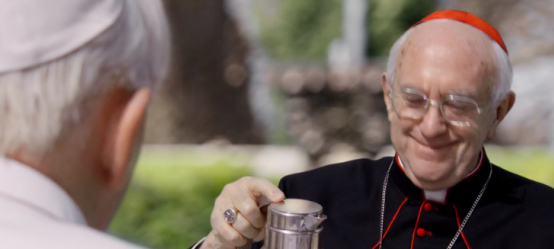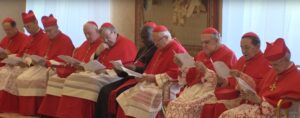
“You are one of my harshest critics. The way you live is a criticism. Your shoes are a criticism!”
Might Pope Emeritus Benedict XVI ever have said this to Pope Francis, who replaced him in 2013? God knows – but the Netflix movie ‘The Two Popes‘ – to be viewable everywhere Dec 20th – faces us with that possibility. Here Des Brady gives us a brief and welcome ‘heads up’.
Opening for limited viewing in cinemas this weekend is a new film, The Two Popes which will be of much interest to keen observers of Vatican politics as well as to admirers of Pope Francis. The film can be described as semi-fictional, with roughly half of it factual to his life prior to coming to the papacy and the other half an imagined theological debate between the ‘liberal’ Francis and the ‘conservative’ Benedict XVI.
This, of course, might look like a recipe for a boring or tiring 128 minutes but it never becomes that for a number of reasons. In the first place, in the course of the intense debate between the two men, award winning director Fernando Meirelles (City of God) introduces flashbacks into the life of Jorge Mario Bergoglio as a youth, as a priest and as an Archbishop in a throbbing and troubled Buenos Aires. In addition, he introduces many instances of levity, such as when as Pope, Francis himself phones to book an airline ticket with a disbelieving airline clerk who is not going to fall for a prankster claiming to be the Pope ringing from Vatican city – and hangs up on him.
The second reason why this film never falters is the powerful performances of renowned British actors, Anthony Hopkins as Benedict and Jonathan Pryce as Jorge Bergoglio. Hopkins is wonderful as the purportedly humourless, rigid and dogmatic German while Pryce, though not initially convincing in appearance as the Argentinian, very quickly wins us over. Look out for mention of both of them when the Hollywood Oscar nominations are announced in the next few months.
The film opens with the death of John Paul II in 2005, the gathering of cardinals in Rome to elect a successor, and the consistory which elected Cardinal Ratzinger as Pope. One of the big successes of this film is the very skilled way in which the editors have managed to merge seamlessly actual film archive with newly shot scenes in the wonderfully recreated Sistine Chapel in Cinecitta Studios in Rome. The film is worth going to for the almost-documentary-like recreation of the election process in which Ratzinger is deemed elected with Bergoglio a far-away second on the ballot papers.
It then moves to 2013, when Cardinal Bergoglio, now Archbishop of Buenos Aires, sends a request to Pope Benedict requesting a meeting at which he wishes to resign his post and return to a role of simple priest tending to the poor. The film fictionalises that the resignation is due to his frustration with the papacy of Benedict and his unhappiness at the irrelevance of much of the Church’s teachings to his poverty-stricken flock. At the same time, Benedict has decided that he wishes to stand down as pope and wants to carry out an intense inquisition of Bergoglio who he suspects will be favourite to succeed him. The rest of the film, with occasional flashbacks and often funny incidents, is concerned with the theological debate between the two men on both the teachings of the Church and its future.

Cardinals attending a consistory – a formal meeting of the church’s top officials – at the Vatican in Rome
This debate is, of course, entirely fictionalised but in writing the dialogue for the screenplay, Anthony McCarten falls back on much of the sermons and speeches later given by Francis during his papacy.
Overall, this is a very interesting and entertaining film. In addition to the wonderful acting performances, both the camera work and the musical soundtrack are faultless. That said, many will find something in it that they consider inaccurate or unfair. For example, Bergoglio wrote his 2013 resignation letter because he had reached the retirement age of 75. In the film, he says that among other teachings which need consideration is abortion. This is not on the real Francis’s agenda.
In writing the script McCarten’s sympathies very clearly lie with Francis, although he does not shirk from including references to his failure as Archbishop to protect his priests and to speak out against the tyranny of the repressive Argentinian military junta. Additionally, he is probably somewhat unfair to Benedict, picturing him as totally lacking in humour, humanity and at times humility. In reality, many of those who knew him well, as well as students who were close to him prior to his papacy, bear witness to his kindness and friendliness. However, these are small points. Go for the wonderful acting, the reminder of the poverty and repression in Argentina, the splendour of the Vatican and Castel Gandolfo, and the reenactment of the papal consistories.
As mentioned, the film opened for limited showings in a number of cinemas throughout the USA, UK and Ireland on November 29th, prior to digital streaming on December 20, 2019 on Netflix. Dublin cinema goers have the opportunity to see it in the IFI cinema, where there is the added attraction of total surround sound. Elsewhere in Ireland, distribution appears to be confined to art cinemas such as the Palas in Galway.
For trailers to The Two Popes, go here.
ACI Submission to Conference of Irish Bishops – 01/10/2019REFERENCES / TAGS
The Two Popes
Fernando Meirelles
Anthony Hopkins
Jonathan Pryce
Anthony McCarten